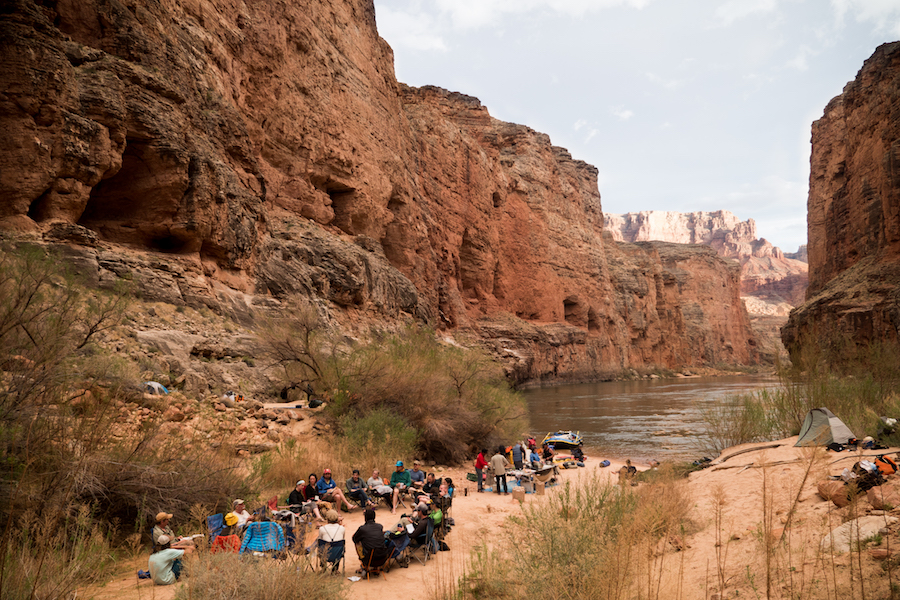
UC Davis students of ecogeomorphology class journey through Colorado River and Grand Canyon
Steep, rocky cliffsides. Raging river rapids. A camp underneath a night sky brightly lit with luminous stars. These were the classrooms of Geology 136: Ecogeomorphology, a course offered by faculty from both the UC Davis Department of Earth and Planetary Sciences and the Center for Watershed Sciences.
The ecogeomorphology class is offered to undergraduate and graduate students pursuing degrees in the physical sciences, biological sciences and engineering. The course mainly focuses on topics such as river management and riparian ecology, but also has an interdisciplinary aspect to it, incorporating fields like science communication and economics.
Aside from a class that meets once a week within the classroom setting, the course also includes a field study opportunity where students travel to wilderness areas for a few weeks to enhance their studies.
“To me, [this class] is a lot of what UC Davis is,” said Nicholas Pinter, professor in the Department of Earth and Planetary Sciences. “It’s cutting-edge science — not just any science, not just one flavor of science, but it’s multidisciplinary science. And it’s doing that in incredible wild, scenic locations, rivers in particular.”
Last quarter, the class concluded with a trip along the Colorado River during spring break. In order to apply what they learned in the classroom, they explored and examined the intricate ecological and geological features of the river and the Grand Canyon. Students rafted, hiked and gave presentations on their surrounding environments, sharing their areas of expertise with one another.
“[Students] did barefoot lectures, typically in the evening or someplace on the cliffside during the day or wherever was appropriate,” Pinter said. “The blackboard was sometimes this two [to] three-thousand-foot-high cliffside behind you, the river passing by, the fish down in the river.”
Twenty-seven graduate students attended the trip, as well as several instructors, staff and guides from Campus Recreation’s Outdoor Adventures. The entire trip lasted 19 days and covered over 200 miles of the river. Most students participated in only half of the trip. Nevertheless, the trip was a unique, hands-on experience for all.
“Being in the environment that you’re studying, students can not only learn the complexity [of watershed sciences], but also teach each other,” said Carson Jeffres, researcher at the Center for Watershed Sciences and graduate student in ecology. “Everybody brings their own specialty to this class. Along with the professor instructing, the students are also instructing their peers.”
According to students who went on the trip, rafting along the river was quite a thrilling experience itself. The waters ranged from slow, peaceful currents to strong river rapids. The most notorious rapid was the Lava Falls Rapid, which the students encountered during the second half of the trip.
“The rapids were like a rollercoaster sometimes,” said Millie Levin, a second-year graduate student in geology who went on the entire trip. “[They] were definitely my favorite. [At Lava], everyone was really nervous. We didn’t flip, but there was just so much water pouring at us. We held on for dear life.”
To wrap up the day, the students would pull over to the edge of the river, unload their boats and set up a camp for the night. The camps were not only a time for resting and recharging, but also socializing and bonding. Students played guitars and sang songs together under the night sky.
“It’s an environment that most people don’t get very often,” Jeffres said. “You’re not checking your phone, you’re not checking your email. Everything is gone and you’re just so part of the community of people [who’re] around you. On the last day, you see this community that’s changed from being a group of students who were in a class together to a small family.”
Overall, the ecogeomorphology class is a learning experience unique to UC Davis, and is highly recommended by students and instructors.
“It was a class, but it didn’t feel like it,” Levin said. “The classroom was the river’s edge. Doing things that are active and hands-on — that’s what I like to do, and this was the perfect class for that. I wish everyone could do it.”
Written by: Jennie Chang — features@theaggie.org










